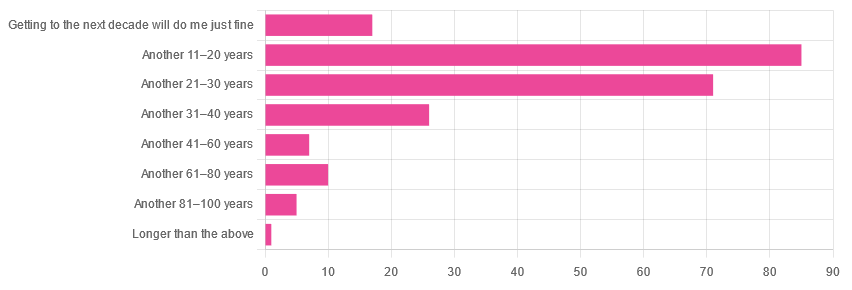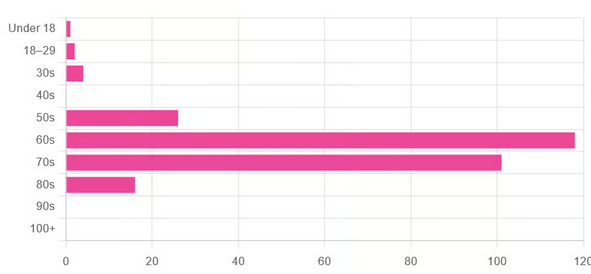
Today’s almonds were activated by:

❝Those who think they have no time for bodily exercise will sooner or later have to find time for illness❞

⏰ IN A RUSH?
Today’s 30-Second Summary
If you don’t have time to read the whole email today, here are some key takeaways:
If you are in a wealthy country that’s not a warzone and you are in a sufficient wealth bracket to have good health insurance (as applicable), you can safely expect to live into your 80s, all things being equal
Life expectancy, compared to previous years, has not been doing great these past few years, mostly because of COVID
On a happier note, if you pass the age of 105, you essentially stop aging, and mortality rate plateaus. That’s not a free pass to immortality, because the mortality rate plateaus at a high rate, but the point is, it doesn’t get any worse after that.
If you enjoy the condensed daily dose of digestible health information from 10almonds, you might well like today’s sponsor 1and1, too.
This (free!) newsletter's goal is to help you get 1% better every week and build positive wellness habits that stick. They also cover finances, relationships, and more.
Read on to learn about these things and more…

👀 WATCH AND LEARN
How to strengthen your cartilage (5:49)
For when you want your knees to last:
Cartilaginous menu:
Want to watch it, but not right now? Bookmark it for later 🔖

⌛ MAIN FEATURE
How much hope can we reasonably have of reaching 100?
Yesterday, we asked you: assuming a good Health-Related Quality of Life (HRQoL), how much longer do you hope to live?
We got the above-depicted, below-described, set of responses:
A little over 38% of respondents hope to live another 11–20 years
A little over 31% hope to live another 31–40 years
A little over 7% will be content to make it to the next decade
One (1) respondent hopes to live longer than an additional 100 years
This is interesting when we put it against our graph of how old our subscribers are:
…because it corresponds inversely, right down to the gap/dent in the 40s. And—we may hypothesize—that one person under 18 who hopes to live to 120, perhaps.
This suggests that optimism remains more or less constant, with just a few wobbles that would probably be un-wobbled with a larger sample size.
In other words: most of our education-minded, health-conscious subscriber-base hope to make it to the age of 90-something, while for the most part feeling that 100+ is overly optimistic.
Writer’s anecdote: once upon a time, I was at a longevity conference in Brussels, and a speaker did a similar survey, but by show of hands. He started low by asking “put your hands up if you want to live at least a few more minutes”. I did so, with an urgency that made him laugh, and say “Don’t worry; I don’t have a gun hidden up here!”
Conjecture aside… What does the science say about our optimism?
First of all, a quick recap…
To not give you the same information twice, let’s note we did an “aging mythbusting” piece already covering:
Aging is inevitable: True or False?
Aging is, and always will be, unstoppable: True or False?
We can slow aging: True or False?
It’s too early to worry about… / It’s too late to do anything about… True or False?
We can halt aging: True or False?
We can reverse aging: True or False?
But those aren’t really being younger, we’ll still die when our time is up: True or False?
You can read the answers to all of those here:
Now, onwards…
It is unreasonable to expect to live past 100: True or False?
True or False, depending on your own circumstances.
First, external circumstances: the modal average person in Hong Kong is currently in their 50s and can expect to live into their late 80s, while the modal average person in Gaza is 14 and may not expect to make it to 15 right now.
To avoid extremes, let’s look at the US, where the modal average person is currently in their 30s and can expect to live into their 70s:
Now, before that unduly worries our many readers already in their 70s…
Next, personal circumstances: not just your health, but your socioeconomic standing. And in the US, one of the biggest factors is the kind of health insurance one has:
You may note that the above source puts all groups into a life expectancy in the 80s—whereas the previous source gave 70s.
Why is this? It’s because the SOA, whose primary job is calculating life insurance risks, is working from a sample of people who have, or are applying for, life insurance. So it misses out many people who die younger without such.
New advances in medical technology are helping people to live longer: True or False?
True, assuming access to those. Our subscribers are mostly in North America, and have an economic position that affords good access to healthcare. But beware…
On the one hand:
On the other hand:
COVID is, of course, largely to blame for that, though:
❝The decline of 1.8 years in life expectancy was primarily due to increases in mortality from COVID-19 (61.2% of the negative contribution).
The decline in life expectancy would have been even greater if not for the offsetting effects of decreases in mortality due to cancer (43.1%)❞
The US stats are applicable to Canada, the UK, and Australia: True or False?
False: it’s not quite so universal. Differences in healthcare systems will account for a lot, but there are other factors too:
Here’s an interesting (UK-based) tool that calculates not just your life expectancy, but also gives the odds of living to various ages (e.g. this writer was given odds of living to 87, 96, 100).
Check yours here:
To finish on a cheery note…
Data from Italian centenarians suggests a “mortality plateau”:
❝The risk of dying leveled off in people 105 and older, the team reports online today in Science.
That means a 106-year-old has the same probability of living to 107 as a 111-year-old does of living to 112.
Furthermore, when the researchers broke down the data by the subjects' year of birth, they noticed that over time, more people appear to be reaching age 105.❞
Pop-sci source: Once you hit this age, aging appears to stop
Take care!

❤ OUR SPONSORS MAKE THIS PUBLICATION POSSIBLE
Get 1% better, every week
If you enjoy the condensed daily dose of digestible health information from 10almonds, you might well like 1and1, too.
This (free!) newsletter's goal is to help you get 1% better weekly and build positive wellness habits that stick. They also cover finances, relationships, and more.
Unlike 10almonds, they put out new editions a couple of times per week, but there’s plenty of practical content in those, to make it very much worthwhile.
After all, gradual habitual improvement gives compound interest over time!
You can opt in here:

Sponsored
1AND1
Join the 10,000+ readers that use our expert advice and inspiring stories to get 1% better weekly and build positive wellness habits that stick.
Please do visit our sponsors—they help keep 10almonds free

🌍 AROUND THE WEB
What’s happening in the health world…
What to know about home care services
Does tinnitus cause hearing loss in normal hearing individuals?
Diets play a major role in reducing the risk of Alzheimer's disease
What's behind the holiday-suicide myth?
Bidirectional relationship seen between overactive bladder, poor sleep
Identification of avoidable risk factors for Parkinson’s Disease
Why long-term care insurance falls short for so many
More to come tomorrow!

📖 ONE-MINUTE BOOK REVIEW
ADHD 2.0: New Science and Essential Strategies for Thriving with Distraction – by Dr. Edward Hallowell & Dr. John Ratey
A lot of ADHD literature is based on the assumption that the reader is a 30-something parent of a child with ADHD. This book, on the other hand, addresses all ages, and includes just as readily the likelihood that the person with ADHD is the reader, and/or the reader's partner.
The authors cover such topics as:
ADHD mythbusting, before moving on to...
The problems of ADHD, and the benefits that those exact same traits can bring too
How to leverage those traits to get fewer of the problems and more of the benefits
The role of diet beyond the obvious, including supplementation
The role of specific exercises (especially HIIT, and balance exercises) in benefiting the ADHD brain
The role of medications—and arguments for and gainst such
The writing style is... Thematic, let's say. The authors have ADHD and it shows. So, expect comprehensive deep-dives from whenever their hyperfocus mode kicked in, and expect no stones left unturned. That said, it is very readable, and well-indexed too, for ease of finding specific sub-topics.
Bottom line: if you are already very familiar with ADHD, you may not learn much, and might reasonably skip this one. However, if you're new to the topic, this book is a great—and practical—primer.

What did you think of today's newsletter?
Wishing a Happy Hanukkah to those who are observing, and a happy Friday to everyone else,
The 10almonds Team



